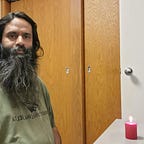Snow bathing.
Snow bathing, also known as snow therapy or snow immersion, is a practice where individuals expose their bodies to the cold and snow for potential health benefits. While some people find it invigorating, it's important to follow best practices to ensure safety:
1. **Gradual Exposure:** Start with short sessions and gradually increase the time spent in the snow. Your body needs time to adapt to the cold.
2. **Dress Appropriately:** Wear warm clothing, including thermal layers, gloves, and a hat. Bare skin contact with snow can lead to frostbite.
3. **Choose a Safe Location:** Find a clean, snow-covered area away from pollution and traffic. Avoid areas with ice, as it can be slippery.
4. **Hydrate:** Drink warm fluids before and after snow bathing to help maintain your core body temperature.
5. **Warm-Up Exercises:** Do light exercises or stretches to warm up your muscles before going out in the cold.
6. **Stay Active:** Keep moving to generate body heat. This can include gentle walking or simple exercises.
7. **Listen to Your Body:** If you start feeling too cold or uncomfortable, it's time to go indoors and warm up.
8. **Avoid Overexposure:** Prolonged exposure to extreme cold can be dangerous. Limit your snow bathing sessions to a reasonable duration.
9. **Know the Risks:** Understand that snow bathing may not be suitable for everyone, especially those with certain medical conditions. Consult with a healthcare professional before starting.
10. **Stay Dry:** After your session, make sure to dry off completely to prevent hypothermia.
11. **Monitor Weather Conditions:** Be aware of the weather forecast, and avoid snow bathing in extremely low temperatures or during severe weather conditions.
12. **Post-Bathing Care:** After snow bathing, warm up gradually by sipping warm beverages and taking a warm bath or shower.
Remember that while some people find snow bathing enjoyable and potentially beneficial for mood and circulation, it's not a replacement for medical treatment. If you have any concerns or underlying health issues, consult with a healthcare provider before engaging in snow bathing.
